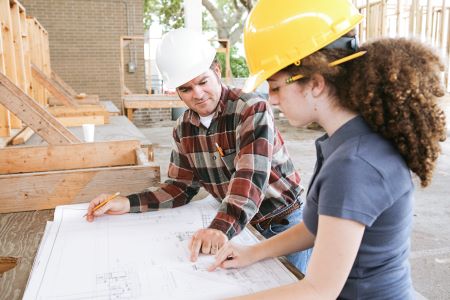 Defining our communities by providing places to gather, work, worship, learn, and share our culture is the core of the construction industry. Its sole purpose is to create the built environment where the future can be imagined, designed, and turned into reality. Where the crossroads of education and innovation will meet is in a building designed and built by construction workers. Construction is the silent partner that allows society’s rich and engaging interactions, and it has been since the beginning of time. However, the industry often faces challenges in recruiting and retaining skilled workers.
Defining our communities by providing places to gather, work, worship, learn, and share our culture is the core of the construction industry. Its sole purpose is to create the built environment where the future can be imagined, designed, and turned into reality. Where the crossroads of education and innovation will meet is in a building designed and built by construction workers. Construction is the silent partner that allows society’s rich and engaging interactions, and it has been since the beginning of time. However, the industry often faces challenges in recruiting and retaining skilled workers.
At the same time, another industry that has been charged with developing our future is education. One builds the mind the other the built environment used to house the classes. Why then is the connection between the two industries not thriving to create a pathway for students to enter the lucrative, rewarding, and socially and economically impacting world of construction after they leave their high schools? Often the lack of interaction lies in the lack of understanding between both groups of what is at stake.
Like any business the construction industry operates off supply and demand. Never in the history of construction has the supply lagged so far behind the demand as it is today with the skilled workforce. I see three main reasons that construction as an industry must invest in partnering with learning institutions to create a better talent pipeline.
1. If they don’t see it, they won’t be it.
Partnerships between school districts and construction companies provide students with early exposure to the construction industry and its career pathways. Career exploration, on-site visits, and guest speakers from construction companies can spark interest and inspire students to consider careers in construction from a young age. This exposure helps break down stereotypes and misconceptions about the industry, attracting a diverse range of talent.
Furthermore, hands-on experiences, such as internships and apprenticeships, give students a taste of what it's like to work in construction. This practical exposure often leads to higher engagement and interest in pursuing construction careers, ultimately benefiting the recruiting efforts of construction companies.
2. Developing a Skilled Workforce
One of the most significant benefits of school district-construction company partnerships is the development of a skilled workforce for recruiting. By working together, these entities can create structured vocational programs and apprenticeships tailored to the construction industry's needs. This allows students to receive hands-on training and education that aligns with the skills and qualifications required in the field before they even graduate from high school. This maximizes potential for both company and school while elevating the earning power of the student.
Construction companies often provide valuable input to school districts regarding curriculum development, ensuring that students are learning the most up-to-date industry standards. This collaboration not only prepares students for rewarding careers in construction but also ensures that construction companies have access to a pool of well-trained and motivated recruits.
3. Tailored Training Programs
Collaboration between school districts and construction companies allows for the development of tailored training programs. These programs can be designed to meet the specific needs and requirements of construction companies in the region. Whether it's specialized skills in masonry, carpentry, electrical work, or project management, partnerships enable the customization of training to address the industry's demands.
This tailored approach ensures that recruits are well-prepared to meet the challenges of the construction field, making them more valuable assets to construction companies upon hiring. It also reduces the need for extensive on-the-job training, saving both time and resources for construction employers. This can be achieved with pre-apprenticeship programs, industry sponsored and taught curriculum, and even externships during the summer for current instructors to hone their skills on the newest things trending in the industry. When the training is not simply a generalized overview but a targeted training program of progressive skill development everyone is better prepared for entry to the industry.
The Result: A brighter future through community ties and engagement
Partnerships between school districts and construction companies have the added benefit of strengthening ties with the local community. Construction companies that actively engage with schools demonstrate their commitment to investing in the future workforce of the region. This positive image not only attracts potential recruits but also fosters goodwill within the community.
Additionally, these partnerships can lead to collaboration on community projects, further enhancing the construction company's reputation and contributing to a sense of pride and ownership among residents. This sense of community engagement can be a powerful recruiting tool, as individuals are often drawn to companies that are seen as responsible and caring community members.
Conclusion
School district-construction company partnerships are a win-win solution for both the education sector and the construction industry. They help create a skilled workforce pipeline, provide early exposure to the industry, offer tailored training programs, and strengthen community ties. As these collaborations continue to thrive, construction companies can look forward to more robust recruiting efforts and a brighter future for the construction industry. By investing in education and nurturing talent from a young age, construction companies are not only securing their own success but also contributing to the growth and vitality of their communities. Need help finding someone to partner with? Contact Construction Career Collaborative at info@c3.org.
The Positive Impact of School District-Construction Company Partnerships on Construction Recruiting
by Angela Taylor | October 11, 2023


